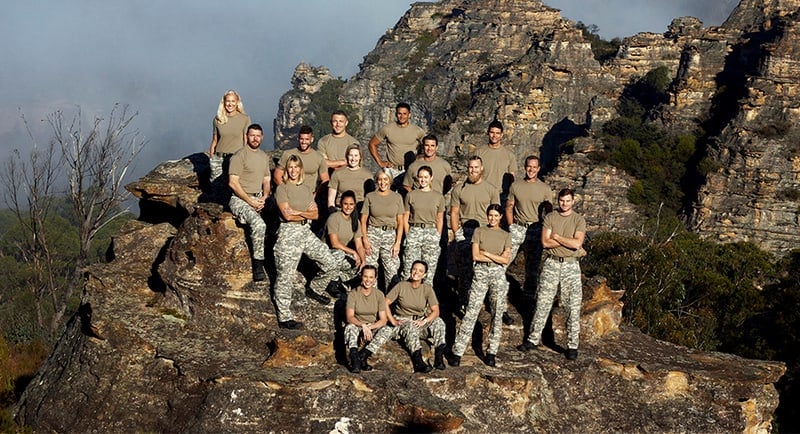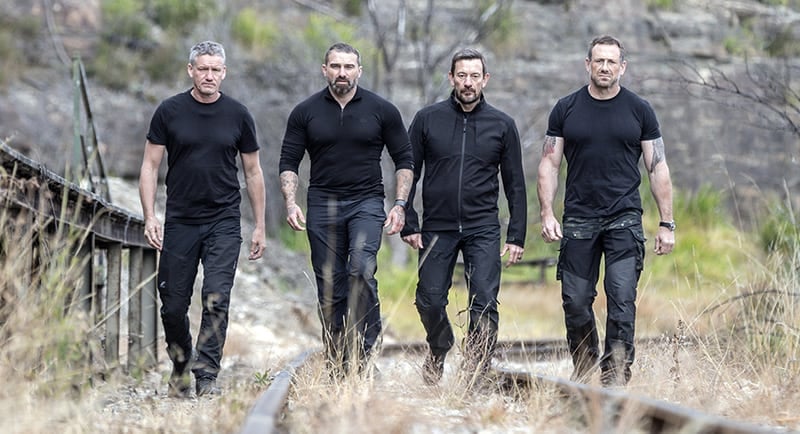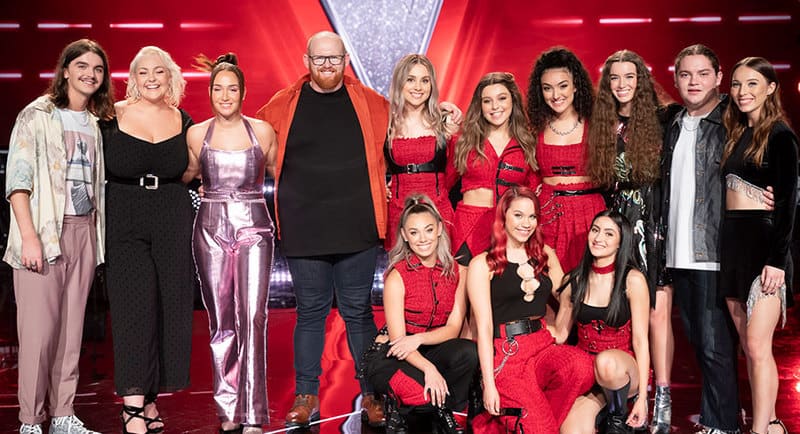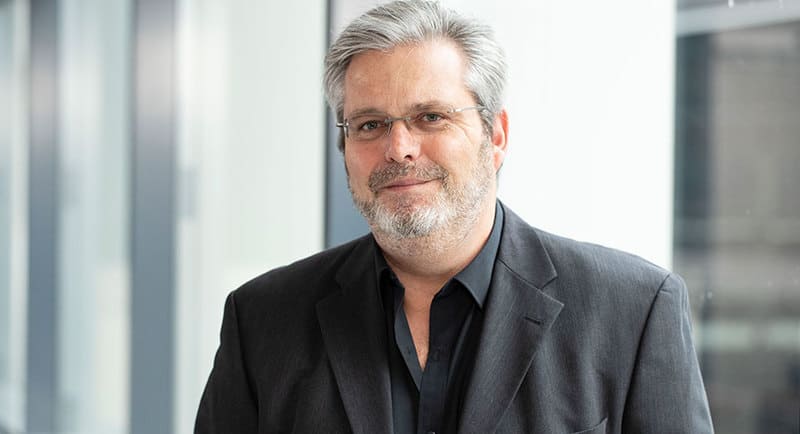SAS Australia will return for its new season on Monday, 13 September at 7.30pm on Channel Seven and 7plus.
Faced with extreme challenges in unforgiving terrain a group of celebrities will eat, sleep, and be tested in punishing conditions, with no allowances or exceptions made for their celebrity status or gender.
Mediaweek spoke to Seven’s director of production Andrew Backwell about what to expect from season two as well as the success of The Voice and gave readers an update on the production of Australian Idol.
Backwell said that one reason for the show’s success last year was that it goes deeper than just the cosmetic action.
“At first glance of the show, you would think it’s about these celebrities doing these dangerous challenges, which is certainly a big part of it. But the x-factor of the show is actually the character development of these celebrities. The viewers start with a preconceived idea of the celebrity and then over the course of the show, you see this character development, and you get to understand the celebrity.
“The amazing thing is that the celebrity is learning stuff about themselves along the way, that’s why the format is so powerful. You change your perception of this person. The funny thing is that this is the one celebrity show that I’ve done that the vast majority has come out afterwards saying that this has been the best experience of their life. In such hard conditions and being essentially tortured out there, they’ve been able to learn something about themselves.”

The first season of SAS Australia didn’t take it easy on the recruits but when asked how Seven will improve on the show for its second season, Backwell said that everything will be scaled up.
“The challenges are bigger and more shocking. What we did learn about it is you need to have the right casting. You need characters that are going to go on a journey and you need characters that are going to reveal something about themselves. Something that maybe they have been hiding from themselves. This brings it all to the surface.
“As a viewer, you see this incredible character development that a lot of other formats don’t achieve because this is so real and so hard. You’ve seen a real honest character development, rather than other reality shows that are a bit fake and gentle and you see someone fall in love, but they never really fell in love. This is absolutely real.”
The recruits are under the direction of elite ex-Special Forces soldiers Ant Middleton, Mark “Billy” Billingham, Jason “Foxy” Fox and Ollie Ollerton, who put the celebrities through a series of physical and psychological tests from the real SAS selection process.
“The amazing thing about the show is the directing staff, Ant Middleton and his team run the production. All we do is film what they’re doing. So it’s not a case of the producer or the cameraman saying “okay, I’m rolling, let’s get started”, the guys do it and if you miss it, you miss it, they don’t stop and they don’t wait for you and they don’t change it. They’re doing a proper SAS course and we just follow and film what happens and the producer has no control. That’s very hard for a producer,” said Backwell.
Comparing SAS Australia to MAFS
SAS Australia is billed as a different type of reality TV due to the severe reality of the content, which differs drastically from other popular shows like Married at First Sight. Backwell said that both types of shows have their appeal.
“MAFS is a brilliant show and it does fantastically in the ratings. I know the format well, I was the head of program and production at Channel Nine. But it’s hard to compare, it’s like comparing apples and oranges. MAFS is constructed reality, they put people together to create a reaction where this is absolutely authentic and real. What you see is what you get. There’s nothing behind the scenes ramping up the drama, what you’re seeing is what is unfolding. Viewers pick that, I’m not saying that the other is not entertaining, but because this show is so real it has a real hook.”
SAS Australia’s next production
The next SAS Australia production will differ from the first two seasons with non-celebrity recruits taking part, and Backwell said the real change will be the experience of the viewer.
“The process that the celebs go through is identical to the process that the non-celebrity recruits go through. For the viewer it’s different, because they know the celebrities, they’re going to have a preconceived idea. Then you see the characters journey. With the civilian version, people are introduced to this person so there’s no preconceived idea. When you meet someone, you judge them, and you think “oh, well, he is going to be good, or she is going to be terrible” and then you see the journey. So for the viewer, it’s different but the actual process is exactly the same. We didn’t go easy on the celebrities or easy on the civilians. Even though it’s different challenges. It’s just as tough and just as confronting, and they’re gonna learn about themselves, whether they’re celebrities or civilians.”

One reason that Seven was able to do this additional SAS Australia production was the availability of Ant Middleton who has cut ties with SAS: Who Dares Wins in the UK.
“That’s certainly worked in our favour. Ant Middleton is absolutely fantastic. He is kind of that one in a million talent and is a brilliant director of staff. He obviously was an exceptional soldier. He’s a motivational speaker, and he’s fantastic on the show. Having access to him has really been crucial for the success of the show. Ant is a very important element of the show and I don’t think it would work as well without him.”
The Voice’s success at Seven
SAS Australia has received an amazing lead in to its new season thanks to The Voice which was the surprise hit of the year after moving from Channel Nine to Channel Seven where it averaged over 1 million viewers per episode. Backwell attributed a number of factors to the show’s success.
“At this time of Covid, people wanted a feel-good show. We wanted to make a show for the whole family. The show became quite narrow, I think it forgot what it was. The premise of the show is not about having these coaches fight with each other, the premise of the show is to give ordinary performers the chance to stand up on stage and show what they’ve got. I think that got lost along the way, it became a lot of fake drama of these coaches bitching at each other. Whereas we wanted the tone to be very positive.”

Backwell said that the success of the show won’t change much with no extra episodes planned after the success of condensing the schedule this year.
“We have done a shorter run than when the show was at Nine. The blind auditions with the spinning chairs have always been the main part of that format. Then it becomes a more traditional show. We’ve contracted that middle part – we do the blind auditions, we go to knockout rounds, semi-finals, and the final very quickly. The ratings have reflected that the audience has liked that change. Going into the next series, we’re going to keep it very similar to what we’ve done. Totally the same number of episodes.”
Australian Idol
After the success of The Voice, Backwell was asked about Seven’s other music show revival, Australian Idol, which he said has been delayed due to Covid-19.
“You can see that there is an appetite for this type of genre. Idol is a fantastic format. We were going to go into production, but obviously, Covid stopped us from producing Idol. There are hundreds of hundreds of people that line up outside the venue for the chance to audition and it’s done live shows in front of an audience of 1000 people. You can’t produce that type of show during Covid.
“The Voice we were able to get away with it, and we had a full audience there that just fell into that patch where things were open, now it would have been much harder. But it’s one of the shows you could achieve in this current environment and Idol wasn’t. So what we’re going to wait to see is when Australia opens up, how it opens up, and then we’ll work up what we’re going to do with Idol after that.
